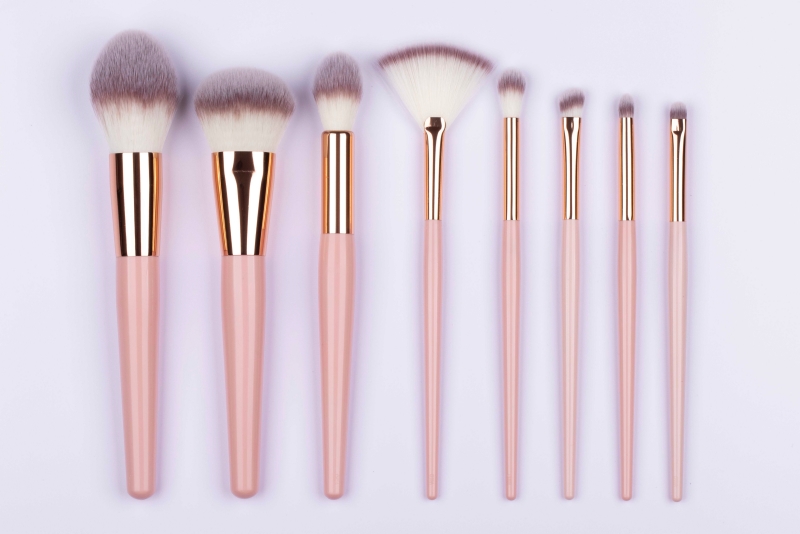+86 198 0337 5938
+86 198 0337 5938
Apr. 17, 2024
Synthetic and natural brushes differ primarily in the materials used for their bristles:
Synthetic Brushes: These brushes are made from man-made materials such as nylon, polyester fibers, or other synthetic fibers. They are often cruelty-free and suitable for vegan users who prefer not to use brushes made from animal hair.
Natural Brushes: Natural brushes are made from animal hair, typically sourced from animals like goats, squirrels, or sable. Common types include goat hair, squirrel hair, and sable hair.
Synthetic Brushes: Synthetic bristles tend to be uniform in texture and density, providing consistent performance. They are usually softer than lower quality natural brushes and are less prone to shedding. Synthetic brushes are often preferred for liquid and cream products because they do not absorb as much product as natural brushes.
Natural Brushes: Natural bristles vary in texture depending on the animal hair used. They can range from soft and fine (e.g., squirrel hair) to firm and coarse (e.g., goat hair). Natural brushes are often preferred for powder products like eyeshadow, blush, and bronzer because they can pick up and deposit product effectively due to their porous nature.
Synthetic Brushes: Synthetic brushes are typically easier to clean and maintain because they do not absorb makeup products as much as natural brushes. They are also more resistant to damage from cleaning agents.
Natural Brushes: Natural brushes require more delicate care and attention during cleaning to prevent damage to the bristles. They may also require conditioning treatments to keep the bristles soft and supple over time.
Synthetic Brushes: Synthetic brushes are often more affordable than high-quality natural brushes, making them accessible to a wider range of consumers. They are also readily available from various brands and manufacturers.
Natural Brushes: High-quality natural brushes tend to be more expensive due to the cost of sourcing and processing animal hair. They may also be less widely available, especially for those looking for cruelty-free options.
Ultimately, the choice between synthetic and natural brushes depends on personal preferences, specific makeup application needs, ethical considerations, and budget constraints.

Determining whether natural or synthetic makeup brushes are better depends on various factors, including personal preferences, specific makeup application needs, ethical considerations, and budget constraints. Here are some considerations to help you decide:
Superior performance with powder products: Natural brushes are often preferred for powder products like eyeshadow, blush, and bronzer because they can pick up and deposit product effectively due to their porous nature.
Natural feel: Some users prefer the feel of natural bristles against their skin, as they can be softer and provide a more luxurious makeup application experience.
Traditional choice: Natural brushes have been used for makeup application for centuries and are often associated with craftsmanship and quality.
Maintenance: Natural brushes require more delicate care and attention during cleaning to prevent damage to the bristles. They may also require conditioning treatments to keep the bristles soft and supple over time.
Limited availability: High-quality natural brushes can be more expensive and less widely available compared to synthetic brushes. Additionally, some users may have ethical concerns about using brushes made from animal hair.
Versatility: Synthetic brushes can be used with both liquid and powder products, making them a versatile choice for various makeup application techniques.
Cruelty-free and vegan: Synthetic brushes are typically made from man-made materials and are suitable for users who prefer not to use brushes made from animal hair.
Easy maintenance: Synthetic brushes are often easier to clean and maintain because they do not absorb makeup products as much as natural brushes. They are also more resistant to damage from cleaning agents.
Performance with powder products: While synthetic brushes can work well with powder products, some users may find that natural brushes provide superior performance and blending capabilities, especially with finely milled powders.
Texture: Synthetic bristles may feel different against the skin compared to natural bristles, and some users may prefer the natural feel of animal hair brushes.
Ultimately, the 'better' choice between natural and synthetic makeup brushes is subjective and depends on individual preferences and needs. Some users may prefer the performance and feel of natural brushes, while others may prioritize factors such as cruelty-free options, ease of maintenance, and budget considerations offered by synthetic brushes. It's essential to consider these factors and choose the type of brush that best suits your preferences and values.
Leave a Message
